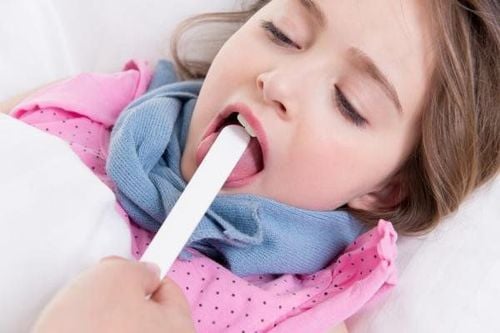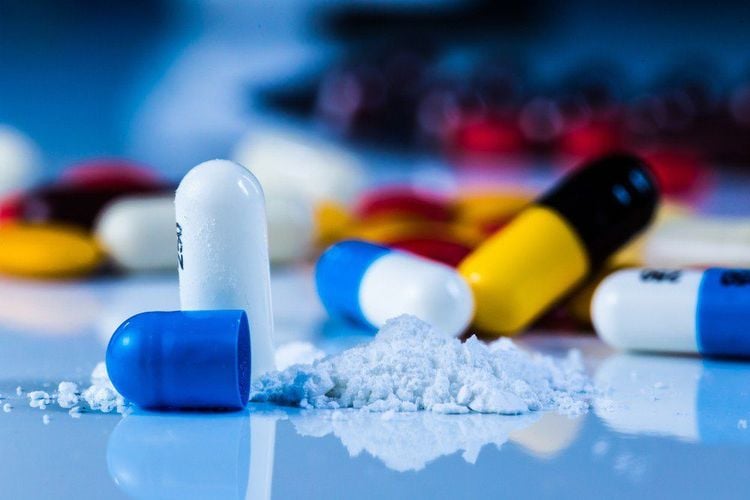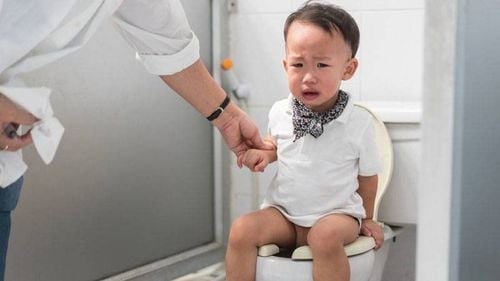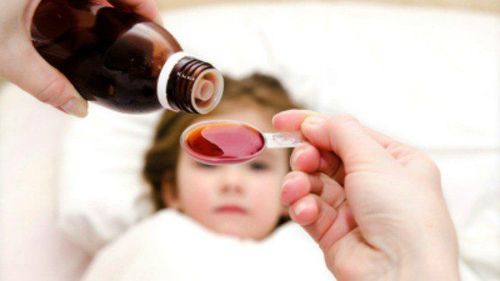This is an automatically translated article.
The article was professionally consulted by Doctor of Pediatrics - Neonatology - Vinmec Nha Trang International General Hospital.Strep throat in children, if not treated promptly, can cause many dangerous complications such as infections in the tonsils, ears, blood; nephritis and rheumatic fever, damage to heart valves,... Therefore, it is necessary to take effective measures to prevent and treat strep throat early.
1. A brief overview of strep throat in children
Strep throat in children is an inflammation, swelling and burning pain in the throat caused by Streptococcus bacteria. Symptoms of the disease are often more severe than viral pharyngitis. Is strep throat dangerous? If not treated in time, the disease can cause dangerous complications such as kidney inflammation or rheumatic heart disease. Rheumatic heart disease can leave sequelae of heart valve damage.Streptococcal pharyngitis is most common in children between the ages of 5 and 15. However, it can occur at any age. Common symptoms of the disease include: sore throat; difficulty swallowing; swollen red tonsils, sometimes with white spots or streaks of pus; painful swelling of the lymph nodes in the neck; fever over 38°C; headache; rash; abdominal pain, sometimes vomiting; not eating well; muscle pain and stiffness; tired.
The cause of the disease is Streptococcus pyogenes or Group A Streptococcus. This is a contagious disease, mainly spread by respiratory droplets (inhaling water droplets in the air by coughing or sneezing by an infected person), eating or drinking. shared with the patient; contact with contaminated objects.
2. Diagnosis of strep throat
Diagnosis is based on clinical symptoms; Collecting throat fluid samples: To determine the presence of pathogenic bacteria or not; Antigen test: Performed when results from fluid sampling do not meet diagnostic requirements.
Chẩn đoán dựa trên triệu chứng lâm sàng
3. Treatment of strep throat in children
Children with strep throat will be prescribed antibiotics and other supportive treatment drugs.3.1 Use of antibiotics Antibiotic groups help reduce mortality and complications of acute streptococcal pharyngitis.
With the treatment of group A streptococcus, antibiotics such as penicillins, macrolides or cephalosporins can be used. In particular, the penicillin group of antibiotics is the first choice in the treatment of strep throat because of its ease of use, low cost and high effectiveness.
In case the patient has a history of allergy to the penicillin group of drugs, other drug groups such as cephalosporins (cefadroxil, cefuroxime, cefixime, ...) and macrolides can be used.
When using antibiotics, patients need to strictly follow the doctor's instructions on the dose, the number of times to take the drug a day, the time to take the drug for a course of treatment and remember to follow up with the scheduled appointment. If unusual symptoms occur during the use of antibiotics such as nausea, rash, ... the patient should promptly notify the doctor.
3.2 Use other supportive drugs Besides using antibiotics to kill group A streptococcus, patients need to combine the use of additional supportive drug groups to reduce fever such as paracetamol (for high fever above). 38.5°C).
Patients need to take the correct dose as prescribed by the doctor. When taking antipyretic drugs but not lowering or lowering a little, it is necessary to use other measures to reduce fever such as applying warm water to the body,... Do not arbitrarily increase the dose of medicine because it may cause harm to the liver.
Anti-inflammatory and anti-edematous drugs such as alphachymotrypsin are also often prescribed for patients with strep throat.
3.3 Attention in daily life Get more rest: Get enough sleep to help the body have enough strength to fight infections. Should rest after antibiotic treatment for at least 24 hours; Drink plenty of water: Keeps the throat moist, which helps to reduce painful swallowing and prevent dehydration; Eat light, easy-to-swallow foods: Broth, soup, apple puree, mashed cereal, mashed potatoes, sweet fruit, yogurt, and soft-boiled eggs. Avoid spicy foods or acidic foods such as orange juice, lemon juice, grape juice,...; Gargle with warm salt water: Gargle several times a day with warm salt water to relieve sore throat; Stay away from irritants: Do not be exposed to secondhand smoke.

Các nhóm thuốc kháng sinh giúp giảm tỷ lệ tử vong và biến chứng của các thể viêm họng do liên cầu khuẩn cấp tính
4. How to prevent strep throat in children?
Keep the patient's utensils, dishes, and water glasses separate, and wash them with soapy water and warm water after use; The patient does not share food, water, tissues, towels, etc. with other family members; Patients should cover their mouth when coughing or sneezing to prevent the spread of group A streptococci into the air; Wash your hands often with soap, especially before eating and after using the toilet. Strep throat in children can cause many unpredictable complications. Therefore, when children have symptoms of illness such as sore throat, fever, headache, difficulty swallowing, etc., parents should quickly take their children to the doctor for accurate diagnosis and timely treatment. At the same time, in daily activities, it is necessary to pay attention to measures to prevent the spread of diseases.When a child has strep throat, parents can take the child to Vinmec International General Hospital for examination and treatment. Vinmec brings together a team of experienced and qualified pediatric specialists capable of synchronously and effectively deploying the most advanced diagnostic and treatment methods, with the support of a system of technical equipment. modern art according to international standards.
For detailed advice on strep throat in children, please come directly to Vinmec health system or register online HERE.
MORE:
Infectious pharyngitis: What you need to know What is a superinfection sore throat? Treatment of pharyngitis caused by bacterial infection with medicine













